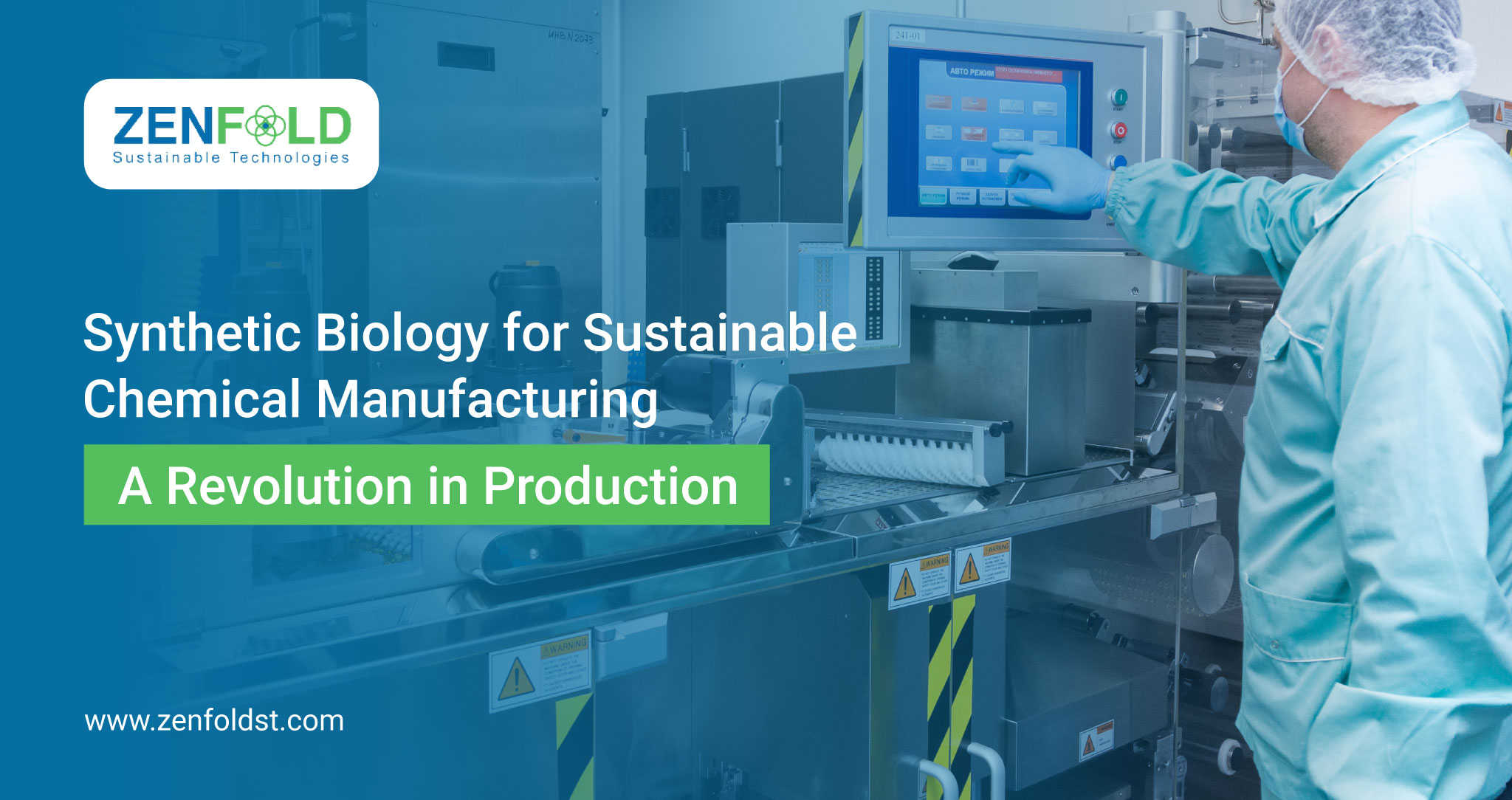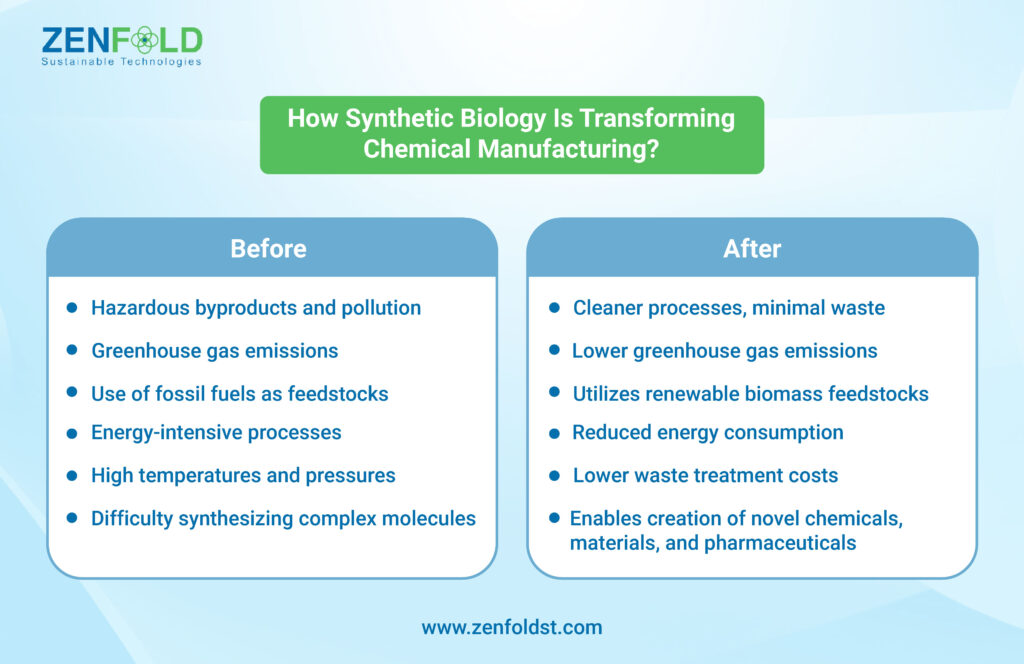-
Call us
-
Send email
31May
Synthetic Biology for Sustainable Chemical Manufacturing: A Revolution in Production
by ticzenfold, 0 Comments

Imagine tiny factories too small to see with the naked eye, manufacturing chemicals in an environmentally friendly way. That’s the incredible potential of synthetic biology. Traditional chemical manufacturing processes often rely on fossil fuels, generate hazardous waste, and have a significant carbon footprint. As public awareness of environmental issues continues to grow, chemical companies are being pushed to adopt cleaner and greener technologies.
This is where synthetic biology comes into play, offering a game-changing solution for sustainable chemical manufacturing. Synthetic biology is an interdisciplinary field that combines principles from biology, chemistry, engineering, and computer science to design and construct new biological systems or redesign existing ones for useful purposes.
Zenfold Sustainable Technologies (ZST) is a leading chemical company in India, which is at the forefront of leveraging synthetic biology to revolutionize chemical production. Its unique approach combines synthetic biology with green chemistry and biotransformation, allowing us to develop sustainable and cost-effective solutions for the pharmaceutical sector and beyond.
Overcoming Chemical Industry Challenges with Synthetic Biology
Here are some of the chemical industry challenges that synthetic biology can help address.
- Environmental Impact
Traditional chemical processes often generate hazardous byproducts, contributing to pollution and greenhouse gas emissions. Synthetic biology offers the potential to design biologically based processes that are cleaner, more efficient, and generate minimal waste.
- Resource Depletion
Many chemical processes rely on non-renewable fossil fuels as feedstocks. Synthetic biology enables the use of renewable biomass feedstocks, such as agricultural waste or algae, reducing dependence on finite resources.
- Energy Intensity
Chemical manufacturing can be energy-intensive, requiring high temperatures and pressures. Biological processes enabled by synthetic biology often operate under mild conditions, reducing energy requirements and associated costs.
- Product Complexity
Some chemicals and pharmaceuticals are extremely complex, making them difficult and expensive to synthesize using traditional methods. Synthetic biology allows for the engineering of microorganisms to produce these complex molecules through metabolic pathways, to overcome the chemical industry challenges.

Synthetic biology is revolutionizing chemical manufacturing through innovative approaches that promote sustainability and efficiency. At ZST, several key strategies are being employed to harness the power of synthetic biology for sustainable chemical production:
- Biocatalysis: Microorganisms are engineered to produce enzymes that can catalyze specific chemical reactions with high selectivity and efficiency. These biocatalysts present an environmentally friendly alternative to traditional chemical catalysts, significantly reducing waste and energy consumption.
- Bioprocessing: By modifying the metabolic pathways of microorganisms, living factories are created to convert renewable feedstocks into high-value chemicals, pharmaceuticals, or biofuels. This method eliminates the need for harsh chemical processes and decreases reliance on non-renewable resources.
- Biosensors: Synthetic biology facilitates the development of biosensors capable of monitoring and regulating bioprocesses in real-time. These biosensors can detect specific molecules, environmental conditions, or metabolic states, enabling precise control and optimization of production processes.
- Metabolic Engineering: Researchers utilize synthetic biology techniques to redesign and optimize the metabolic pathways of microorganisms. This enables the efficient production of desired molecules and the degradation of pollutants and waste materials.
Benefits of Sustainable Chemical Manufacturing with Synthetic Biology
- Reduced Environmental Impact
Biologically based processes are often cleaner, generating less waste and greenhouse gas emissions compared to traditional chemical processes.
- Increased Resource Efficiency
Synthetic biology enables the use of renewable feedstocks, reducing reliance on finite fossil resources and promoting a circular economy.
- Cost Savings
While the initial investment in synthetic biology may be high, the long-term cost savings from reduced energy consumption, waste treatment, and feedstock costs can be substantial.
- Product Innovation
Synthetic biology opens new possibilities for creating novel chemicals, materials, and pharmaceuticals that may be difficult or impossible to synthesize using traditional methods.
- Competitive Advantage
As consumer demand for sustainable products continues to grow, companies that embrace sustainable manufacturing practices like synthetic biology will gain a competitive edge in the market.
The Future of Sustainable Chemical Manufacturing
As synthetic biology evolves, we can expect more innovative applications coming from the chemical companies in India. From the design of microorganisms that can break down plastics and other pollutants to the production of advanced biomaterials and biofuels, the possibilities are endless. By embracing synthetic biology and sustainable manufacturing practices, the chemical industry can not only address pressing environmental challenges but also unlock new avenues for innovation, economic growth, and long-term sustainability.
At ZST, synthetic biology represents the future of sustainable chemical manufacturing. By combining the expertise in synthetic biology, green chemistry, and biotransformation, Zenfold is creating a new paradigm for chemical production that prioritizes environmental sustainability and cost-effectiveness.
Recent Posts
- Why India is the Future of Semiconductor Sourcing
- Exploring Zenfold Sustainable Technologies’ Innovative Approaches in Chemical Manufacturing Supply Chain Management
- Reducing Carbon Footprints in Chemical Manufacturing with Green Chemistry
- The Competitive Edge: How Zenfoldst Stands Out Among Chemical Manufacturing Companies
- Advanced Strategies in Green Chemistry for Sustainable Manufacturing
